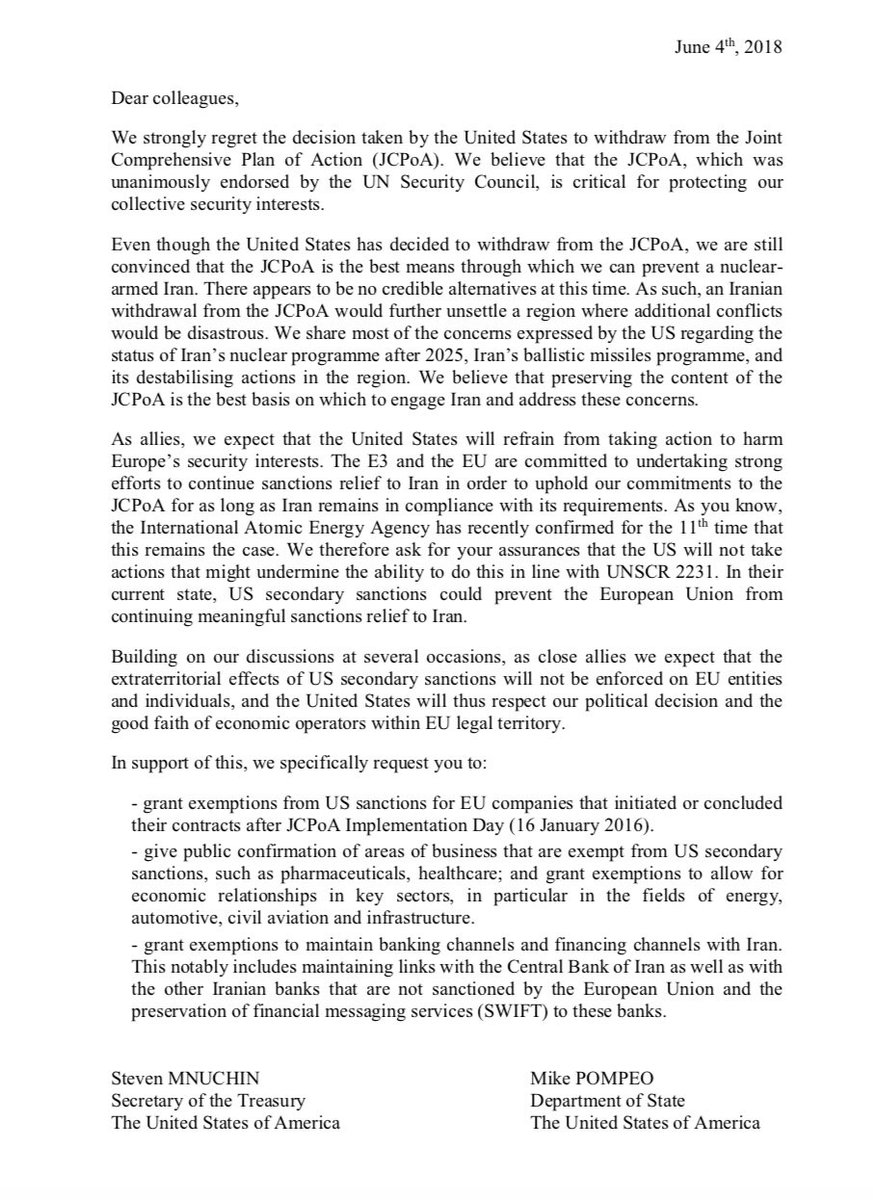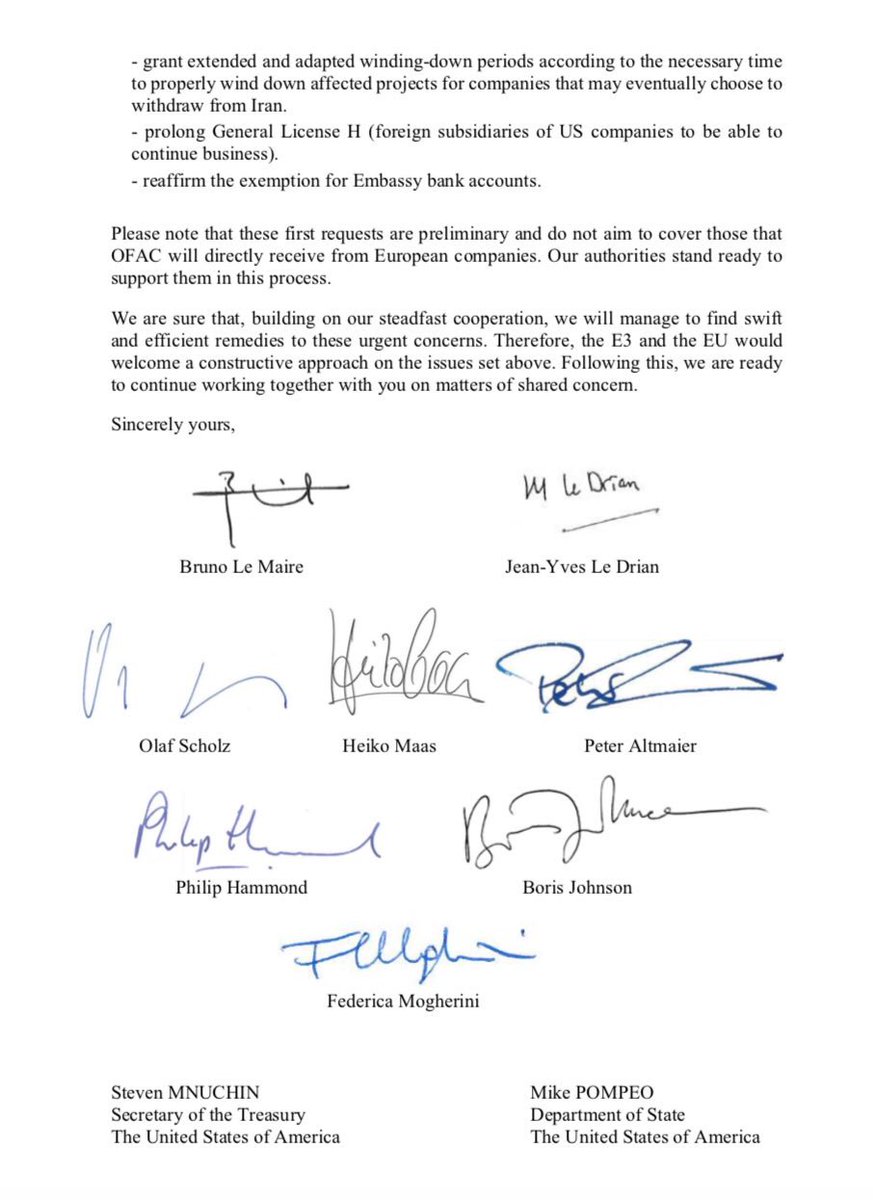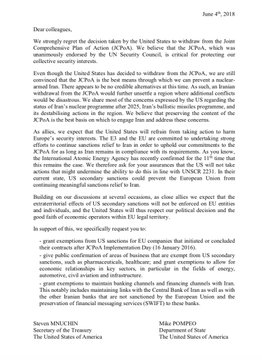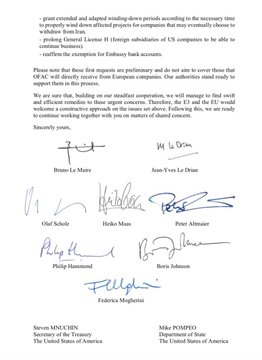"We Cannot Defy The US": European Refiners Fold To Trump, Will Stop Buying Iran Crude
For
all of Europe's bluster, and increasingly vocal "resistance"
to Trump unique approach to international politics, especially when
it comes to Iran when Brussels swore it would defy the US president
and continue business as usual with Tehran, it took Europe about a
month to fold, and as Reuters reports European refiners are now
unofficially winding down oil purchases from Iran, closing the door
on a fifth of the OPEC member’s crude exports.
And
since the only true leverage that Iran had vis-a-vis Europe was its
deeply discounted crude oil, the shuttering of crude purchases from
the Islamic republic will suddenly make European governments
especially ambivalent whether to continue fighting Trump in hopes of
salvaging the Iranian nuclear, when there is only downside left.
How
did Trump win? By the implicit threat to sanctioning and
cutting off Europe's financial institutions, and although European
governments have not - yet - followed Washington by creating
new sanctions, banks,
insurers and shippers are gradually severing ties with Iran under
pressure from the U.S. restrictions, making trade with Tehran
complicated and risky, and if anything, all cash (or bitcoin).
Immediately
after Trump announced on May 4 announced that the US is quitting the
landmark 2015 nuclear deal between Iran and world powers and
reimposed sanctions on Tehran, effectively making Iranian exports
"radioactive" on the global scene, ministers from Germany,
France and Britain protested vocally and repeatedly, urging U.S.
officials to shield European companies from the sanctions, but the
refiners have decided to not take any chances.
“We
cannot defy the United States,” a
senior source at Italy’s Saras, which operates the
300,000-barrels-per-day Sarroch refinery in Sardinia, told Reuters.
Saras is determining how best to halt its purchasing of Iranian oil
within the permitted 180 days, the source said, adding: “It
is not clear yet what the U.S. administration can do but in practice
we can get into trouble.”
Saras
is hardly alone: virtually all other European brand refiners,
including France’s Total, Italy’s Eni, Spain’s Repsol and Cepsa
as well as Greece’s Hellenic Petroleum are preparing to halt
purchases of Iranian oil. These refiners account for most of Europe’s
purchases of Iranian crude, which represent around a fifth of the
country’s oil exports.
Iran’s
crude sales to foreign buyers averaged around 2.5 million bpd in
recent months; and while the bulk of the exports go to Asia, roughly
500kbp/d in Iranian output will now be mothballed.
There
is a few months before all purchases are cut off: the companies will
continue to purchase cargoes until the sanctions take effect, after
the 180-day wind down period ends on Nov. 4.
Europe’s
largest refiner, Total, does not intend to request a waiver to
continue crude oil trading with Iran after Nov. 4. Eni said it had
an oil supply contract outstanding for the purchase of 2 million
barrels per month, expiring at the end of the year.
“Our
trading activity (remains) business as usual ... We continue to
strictly conform with European Union and international laws and
regulations,” a Cepsa spokesman said, clearly forgetting that
Europe's poseur leaders are now part of the anti-Trump resistance.
Or "are" only as long there are some fringe benefits to
be had. Because if Europe can't have access to Iran's cheap oil,
watch how the continent's liberal elite forgets how to even spell
Tehran.
All
this is happening as Europe continues to pretend it is fighting
Trump, if only for naive public consumption, and on Wednesday, the
EU again urged the Trump administration to exempt European
companies from sanctions on Iran.
Ministers
from Germany, the UK and France, along with EU Foreign Policy Chief
Federica Mogherini, have signed a letter asking the US to allow its
companies to continue to trade with Iran and spare certain
industries from punitive measures. “As allies, we expect that the
United States will refrain from taking action to harm Europe’s
security interests,” the letter states before outlining a list of
demands
 We ask the American authorities, in a letter signed with Germany, the UK and @eu_eeas to exempt European businesses doing legitimate trade in Iran from all extraterritorial American sanctions. Those businesses must be able to pursue their activities.
We ask the American authorities, in a letter signed with Germany, the UK and @eu_eeas to exempt European businesses doing legitimate trade in Iran from all extraterritorial American sanctions. Those businesses must be able to pursue their activities.
The
letter is the functional equivalent of tweeting "thoughts
and prayers"
after yet another tragic terrorist incident or mass shooting event.
Oh well, at least Europe can pretend to say "it did its best."
However,
at the basis of Europe's humanitarian betrayal are not the oil
companies but the banks: banks, shipping firms and insurance
companies are now distancing themselves from the Islamic republic,
leaving Europe’s refiners few options but to stop oil purchases.
“It’s a matter of finding a tanker and an insurer that will cover it. It’s definitely not easy right now,” a source at Repsol said.
Hellenic
had to stop imports because the Swiss bank that it used was no
longer processing payments to Iran, an industry source familiar
with the situation said.
Yet
as Europe prepares to wind down its Iranian oil imports, the
wildcard is Asia, where some buyers are also expected to reduce
their purchases, such as India’s Reliance Industries. The owner
of the world’s biggest refining complex plans to halt oil imports
from Iran, two sources familiar with the matter told Reuters last
week.
The
big question is whether China, which has been making aggressive
inroads into
Chinese commerce in recent years, which recently launched a new
train landline to Iran, and whose state-owned oil giant, CNPC - the
world's third largest oil and gas company by revenue behind Saudi
Aramco and the National Iranian Oil Company - is now set to take
over the role held by Total in a huge gas project in Iran, will
step up its Iranian oil imports and offset the loss of Iranian oil
exports to Europe, India and Japan, and if so, just how will the
Trump administration react.
The
EU is urging the Trump administration to exempt European companies
from sanctions on Iran, as fears grow over the fallout of the US
abandoning the international nuclear deal with Tehran.
Ministers
from Germany, the UK and France, along with EU Foreign Policy Chief
Federica Mogherini, have signed a letter asking the US to allow its
companies to continue to trade with Iran and spare certain industries
from punitive measures.
The
letter, dated June 4, was addressed to US Treasury Secretary Steven
Mnuchin and Secretary of State Mike Pompeo. It expressed
‘strong regret’ over President Donald Trump's decision to
withdraw from the 2015 Iran deal, to which their nations were also
signatories.
We ask the American authorities, in a letter signed with Germany, the UK and @eu_eeas to exempt European businesses doing legitimate trade in Iran from all extraterritorial American sanctions. Those businesses must be able to pursue their activities.
6
June, 2018
Boeing
spokesman said Wednesday, the company would not collaborate
with Tehran, refusing to deliver planes to Iran due
to the US sanctions, effectively aborting a pair of large
contracts with Iranian carriers.
"We
have not delivered any aircraft to Iran, and given we no longer
have a license to sell to Iran at this time, we will
not be delivering any aircraft," the Boeing spokesman said.
In
May it was reported, that Boeing's $20bn Iran contracts were frozen
due to the sanctions.
IranAir
has previously signed $16.6 billion contract with Boeing for the
sale of some 80 passenger planes and also made a $10 billion
deal with the Boeing's rival Airbus for the sale of 100
jetliners. However, the sanctions against Iran would cancel
those deals.
The European corporation was also impacted by the Trump's
decision because some components of its aircraft are
manufactured in the US.
Last
year Trump's administration also probed the possibility of stopping
sales of Boeing aircraft to the Iranian airlines amid the
growing tensions between the countries














No comments:
Post a Comment
Note: only a member of this blog may post a comment.